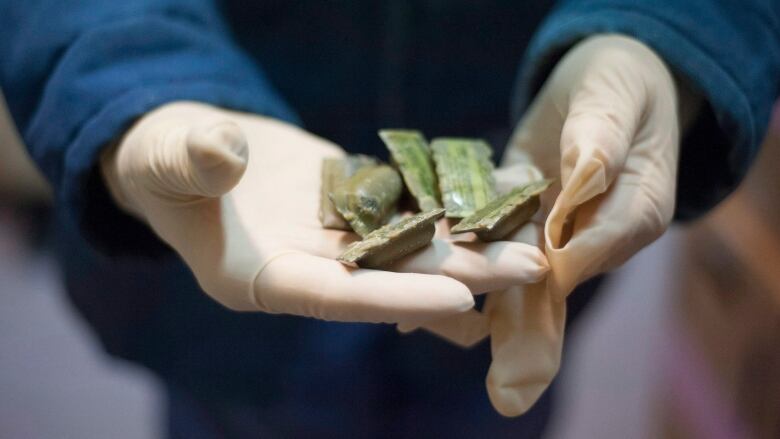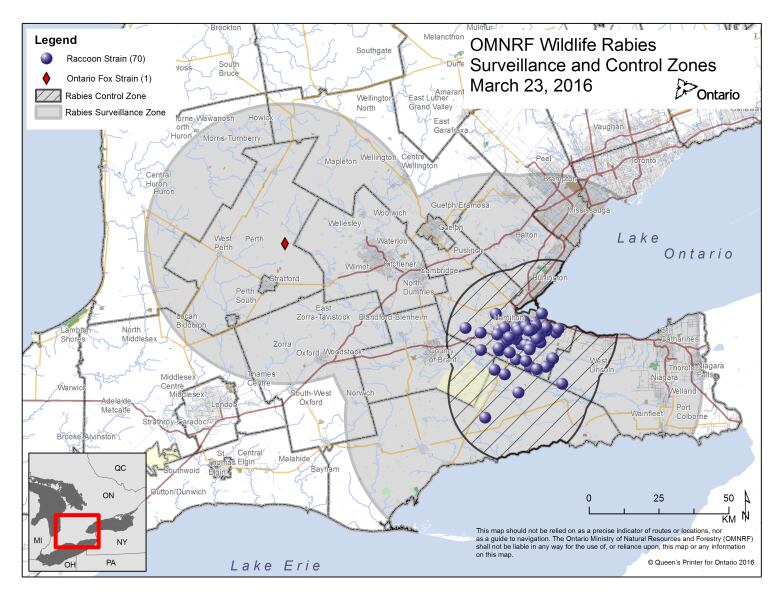Ontario to resume vaccine plan to stop rabies outbreak in Hamilton
Province preparing for a multi-year fight against raccoon rabies

The province is set toresume spreading anti-rabies vaccine packets around Hamilton in early April, targeting skunks and raccoons to stop the spread of the virus.
Chris Davies, head of wildlife research with the province's Ministry of Natural Resources and Forestry, said the province is gearing up for a multi-year fight against this outbreak ofraccoon rabies.
"We expect to have rabies cases for a while," he said. "It takes a while to eliminate a disease from a wildlife population."
- Rabies cases soar in Hamilton, 65animals infected
- How the province scrambled to stop spread of raccoon rabies
The campaign against raccoon rabies in Hamiltonwill be fought differentlythan recent outbreaks inBrockvilleor Quebecbecause instead of baiting in rural areas,the outbreak in Hamilton is almost entirely urban.
The province will be baiting parks, ravines, ditches - "any place that's wildlife habitat, we'll be baiting," Davies said. Dog parks will not likely be baited because the dogs wouldeat them all, he added.

The baiting will stretch out in a 50-kilometre radius from the location of every individual case. This area reaches towest of Toronto, encompasses Kitchener-Waterloo,down to Longpointand extends to near the border of the United States.
"The baiting we're doing out 50-kilometres is a preemptive strike," he said. "We don't have any cases out there, but we're making sureit's not going to spread."
After the first case of rabies was discovered in December, the province dropped 219,000 baits in and around Hamilton.
The baiting was halted at the end of Decemberbecause the animals don't tend to movearound much during the winter.
But now that it's warmer outside, the ministry plans to drop more vaccines again, starting in earlyApril.
Since December, 65 cases of raccoon rabies (46 raccoons and 19 skunks)havebeen identified in Hamilton. Fourraccoons fromHaldimand-Norfolkand oneraccoon from Niagara Region have also tested positive for the virus.
Infected raccoon hitchhiked from U.S.
Davies said the virus mostlikely came into Ontario from the United States by train or truck.
"Raccoon rabies is very commonup and down all the eastern-seaboard states," he said. "There's lots of truck and train traffic that comes in from there."
Ontario hasn't seen a case of raccoon rabies for 10 years, he said, but added"as long as (rabies) exists in the U.S., there's a possibility for it to infect Ontario."
In the mid 2000s, Quebec had a similar outbreak to the current one in Hamilton, Davies said.Using similar baiting techniques and the samevaccine, the virus was eliminated in three years.

In 1999, raccoon rabies was discovered in the Brockville area and it took around six years to eliminate the virus there, using a different vaccine.
Davies said even when the disease is completely removed from the area, the ministry is not allowed to declare itto be officially eliminated until two years have passed since the last case of rabies.
The packets of"bait" are small, roughly the size of aloonie, with attractant on the outside and the vaccine on the inside. The goal is to have skunks and raccoons chewon these packetsand release the vaccine to be absorbed by their body.
Davies said if other animals end up eating them, it won't cause them harm.If a dog were eat a number of these baits, theplastic may give it an upset stomach, but the vaccine won't harm it, he said.
If anyone comes across any of these packets, Davies said they should leave italone.
Only six months in
"The numbers (in Hamilton)are what's to be expected," Davies said. "In 1999, the (rabies) outbreak peaked in Year 3 and we're only six months in here."
In Hamilton, nine cases of raccoon rabies were discovered in December, 12 in January, 21 in February and 23 cases in March according to statistics from the province.
Pets should be kept on leashes, they should be vaccinatedand kept away from wildlife, he said. For anyone looking to live-trap a wild animal to transport it elsewhere, with the current rabies outbreak, now'snot a good time to do that,he said.
"There shouldn't be a panichere," he said, adding the situation is well in control.
Lexus and Mr. Satan fought a raccoon in the back of a van
The raccoon rabies re-emergence in early December only came to light after two large dogs Lexus and Mr. Satan got into a fight with a sick raccoon in the back of an animal services van.
That raccoon tested positive for rabies and the dogs were held in quarantine after being inoculated against the virus.
Immediately after the first reported case the ministry baited the area.Since then, Davies said, the ministry has been testing dead animals for the virus.
The first reported infected skunk came in mid-February.
"Again, we expected this, we expected to find infected skunks, but they are all within the zones we baited for vaccines, so we believe we're in good shape," Davies said.
Davies said they will also drop vaccines north of Stratford, Ont., where the fox strain of the rabies virus was found in a cow.
With files from The Canadian Press












_(720p).jpg)


 OFFICIAL HD MUSIC VIDEO.jpg)
.jpg)



























































































